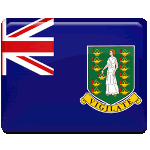Heroes and Forefathers Day in the British Virgin Islands Date in the current year: October 19, 2026
 Heroes and Forefathers Day is a public holiday in the British Virgin Islands, celebrated annually on the third Monday of October. It was established in 2021 to replace Saint Ursula’s Day.
Heroes and Forefathers Day is a public holiday in the British Virgin Islands, celebrated annually on the third Monday of October. It was established in 2021 to replace Saint Ursula’s Day.The Virgin Islands are an archipelago in the Caribbean Sea. They were discovered by Christopher Columbus in 1493 during his second voyage to the Americas. He named the archipelago after Saint Ursula and the 11,000 Virgins (Santa Úrsula y las Once Mil Vírgenes), shortened to the Virgins (las Vírgenes).
Saint Ursula is a Romano-British Christian saint. According to a medieval story, she was a Dumnonian princess who was supposed to marry the Celtic leader Conan Meriadoc. Ursula set sail to undertake a pilgrimage and then join her future husband in Cologne. She was accompanied by 11,000 virginal handmaidens. On her way to Cologne, she encountered Huns, who beheaded all the virgins in a massacre and then shot Ursula with an arrow.
Although the Spanish claimed the archipelago by original discovery, they didn’t settle it. In the mid-17th century, the present day British Virgin Islands became a Dutch colony. The Dutch primarily valued the archipelago for its strategic location between the Netherlands Antilles and New Netherland in North America.
The British took control of the Dutch Virgin Islands during the Third Anglo-Dutch War, capturing the Dutch colony shortly after the outbreak of the war in 1672. They introduced sugar cane and brought African slaves to work on the plantations. The colony thrived until the abolition of slavery in 1834.
From 1872 to 1956, the British Virgin Islands were administered as part of the Federal Colony of the Leeward Islands. In 1958, most island groupings in the Caribbean that were part of the British Empire came together to form the West Indies Federation. However, the Legislative Council of the British Virgin Islands refused to join the new federation.
As a result, the islands became a separate colony in 1960 and were granted autonomy in 1967, following the promulgation of a new constitution. Today, the British Virgin Islands are a British Overseas Territory. In 2002, the citizens of the British Virgin Islands were automatically granted British citizenship by the British Overseas Territories Act 2002.
The feast day of Saint Ursula, observed on October 21, was officially designated as a public holiday in the British Virgin Islands in 1957. However, in 2021, the government of the British Virgin Islands reformed the public holidays of the territory to better reflect its history and culture.
Territory Day was renamed Virgin Islands Day, Festival Monday, Tuesday and Wednesday were renamed Emancipation Monday, Tuesday and Wednesday, Saint Ursula’s Day was replaced with Heroes and Forefathers Day, and November 8 was declared the 1949 Great March and Restoration Day.
According to Deputy Premier Dr. Natalio Wheatley, Heroes and Forefathers Day was established to recognize outstanding Virgin Islanders of the past who contributed to the development of the territory.
- Category
- Public Holidays
- Country
- British Virgin Islands
- Tags
- Heroes and Forefathers Day in the British Virgin Islands, holidays in the British Virgin Islands, public holiday, British Virgin Islands